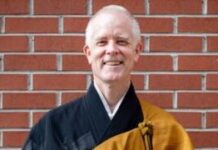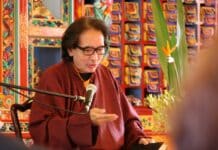Originally posted on the Chonicles February 10, 2010
Listeners’ Comments
I would also like to express my gratitude for Mark’s explanation and understanding of the mamo chants and don season. It is quite easy to get wrapped up in fear and superstition at this time of year. Personally, I take this time of year seriously in regards to chanting and taking into consideration my activity, but with a bit of doubt swirling around me- wondering if my understanding of what I am doing is somehow escued. In particular, I appreciated the straightforward approach that Mark presented regarding slowing down at the end of the year to make a reconnection to practice by not starting a lot of activity and projects. This seems like a sane and rational way to get ready for the year to come.
I have also just read the section on mamos by the Dorje Loppon. Also very helpful. Thank you for posting both of these.
Lisa Steckler
***
Thanks to Mark Nowakowski for his thoughtful remarks concerning the dons.
Michael Chender suggests “there are certain energetic realities, such as specific protectors, that are connected with particular practice traditions; by making the karmic link with those traditions, you inherit all the connections, know it or not.” But he fails to show why that would in fact be the case. E.g., what is the nature of these “connections”? What other indications are there that they exist?
We all have “bad days” and go through “difficult periods” . These can manifest at any time during the year. Why do we need an explanation in religious terms for those when “good” and “bad”, “happy” and “sad” are states of mind that come and go just like everything else that we manufacture and project?
Howard Harawitz
Halifax***
I appreciate the clear and fundamental view Mark has presented. I also feel that there is an energetic side to this I’d like to hear more about. Its very tricky, because its so easy to fall into self-fulfilling superstitious fantasies. However, I do well remember a different feeling around (at least my projection of) the Vidhyadhara’s activities in the don days. He would rarely travel then, and my understanding for us students is that we needed to be particularly mindful about inviting chaos, which is particularly easy to magnetize at this time. There was an energetic quality to the days–the second day before Shambhala Day being “the worst” day of the year. This is a bit different than simply quieting and reviewing the year, ala the Jewish and other traditions.
The way I’ve reconciled the bogeyman vs rationalist approach to this is that there are certain energetic realities, such as specific protectors, that are connected with particular practice traditions; by making the karmic link with those traditions, you inherit all the connections, know it or not. In that light, it won’t be don season for non-Tibetan buddhist practitioners, and it may be a different flavor of and approach to don season for other related sanghas.
I’d be grateful to be corrected, or further educated on this.
Michael Chender
***
Hi Michael,
I appreciate your bringing out the “energetic side” of this. In the interview I was definitely trying to lean away from the vague, superstitious, bogeyman approach that seems to come up. But there is a double-edged side to don days. It’s not just about being simple and mindful, but also being more careful and aware of potential problems as it is a time of transition, similar to dusk, the time of day when we do the protector chants. We need to be open to messages from the phenomenal world. Even if our mindfulness and awareness is very stable, we can still have little leaks, sudden gaps and obstacles. Especially if we become complacent and start to think we know it all.
Maybe this is like what The Grateful Dead sang: ‘Cause when life looks like Easy Street, there is danger at your door.
I too would like to hear more from people who directly received teachings about the Don Days and Mamos from the Vidyadhara. Maybe Loppon Lodro Dorje or Larry or others have some recollections about how the Vidyadhara introduced the whole idea of the end-of-the-year “don days” and the reciting of “Pacifying the Turmoil of the Mamos.”
Ki So,
Mark***
Thanks to Mark for his thoughts on mamos. Sometimes in dispelling so-called superstitious ideas about these forces we rationalize away any magical quality surrounding these forces. I still relate to mamo chant practice as pure magical summoning of otherwise hidden forces, not that it is any kind of “seance” at all, it’s just another vajrayana visualization practice in the realm of sacred world beyond habitual mind view. But still, I don’t know what people I’m summoning in the practice, so it seems very based on trust and leap without knowing. This could be called superstitious, but after hearing all of the rationalizations of the transalators I keep reverting to it. but I still wonder if this might be “superstitious” in the stupid sense. -Bill Wooding, March 1, 2014









